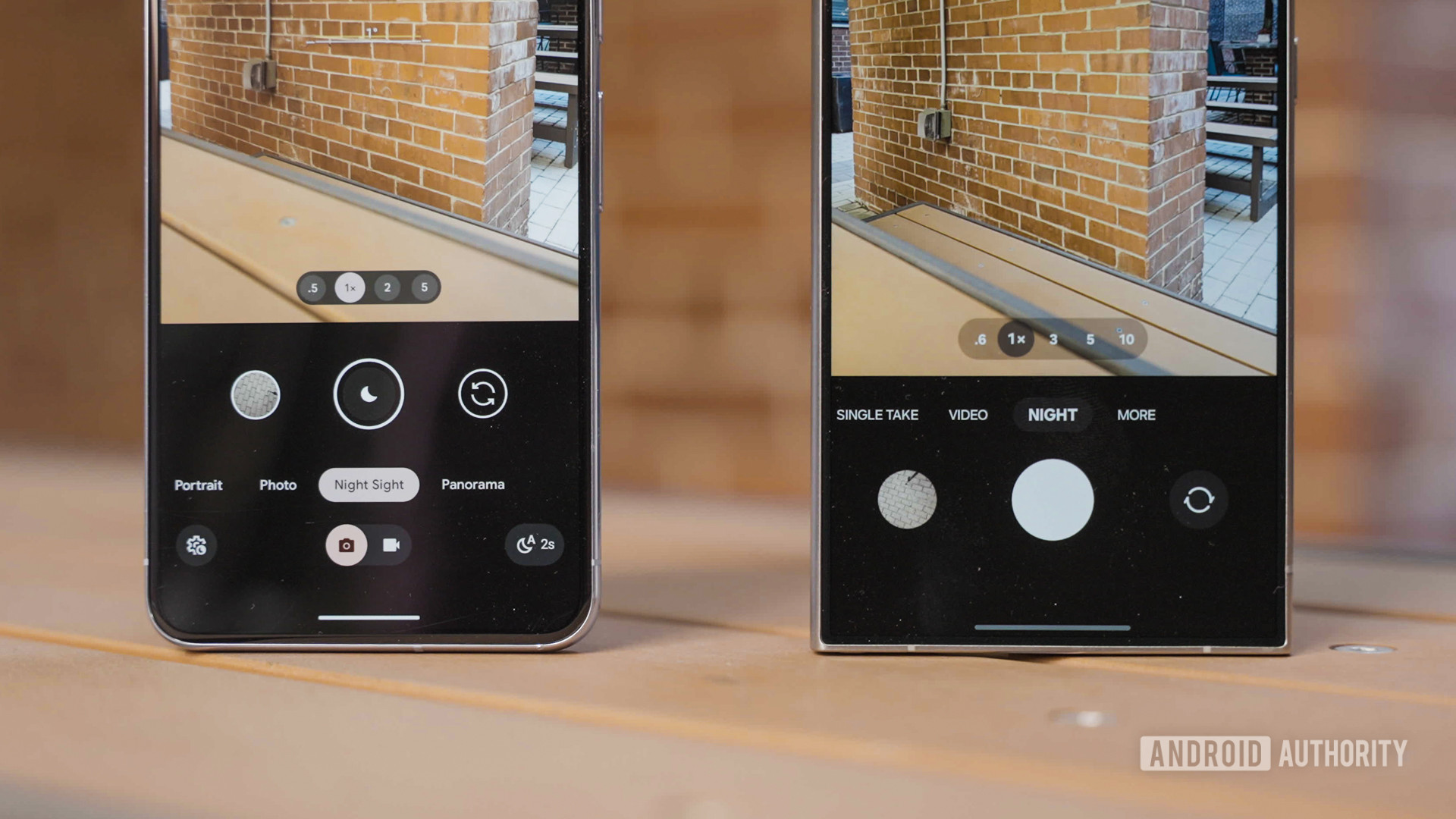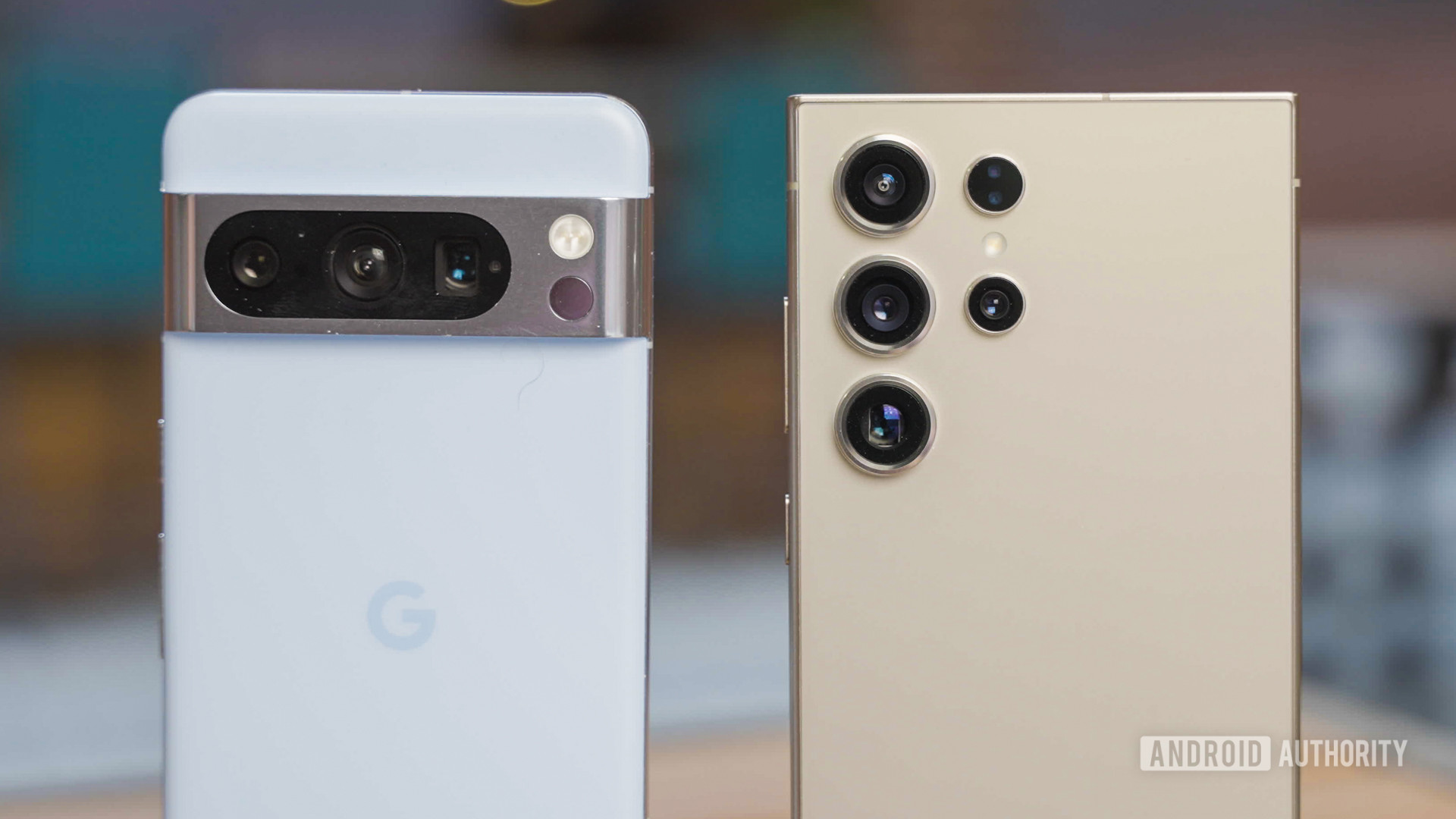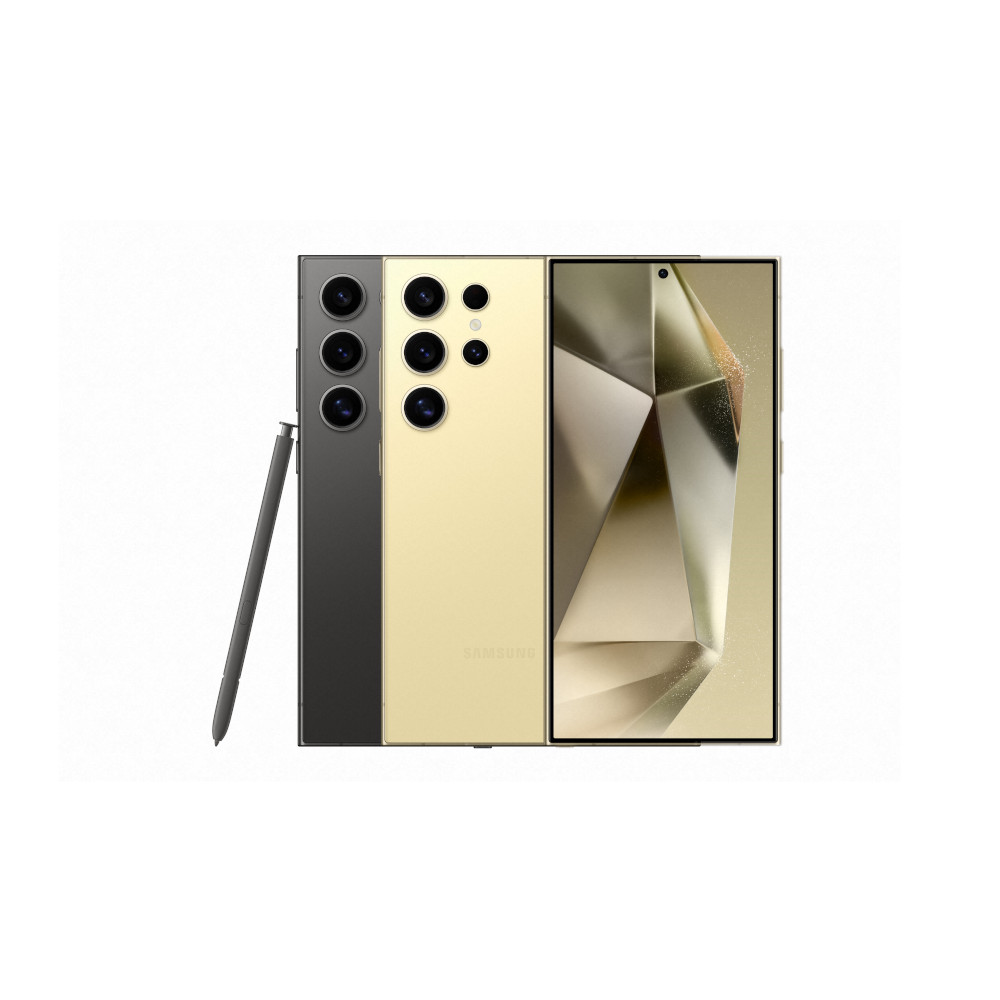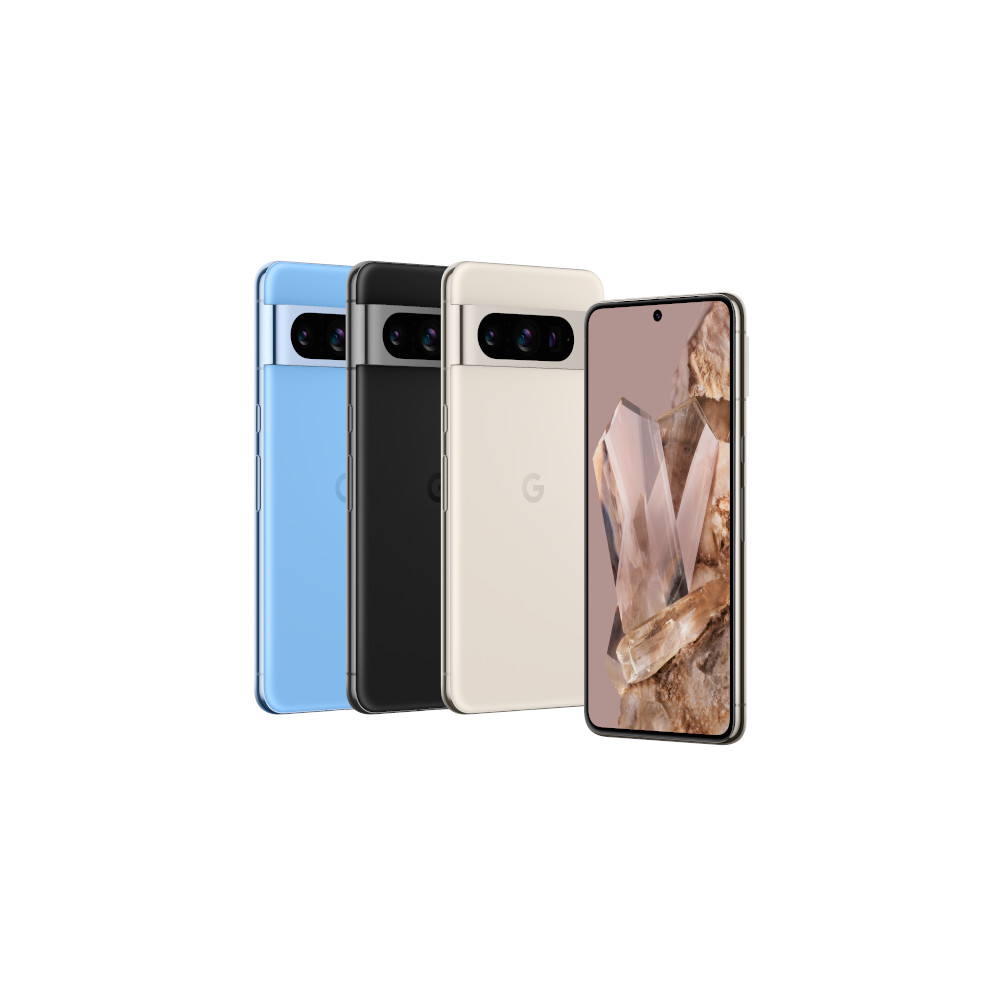Affiliate links on Android Authority may earn us a commission. Learn more.
Samsung Galaxy S24 Ultra vs Google Pixel 8 Pro: Which camera is better at night?
February 18, 2024
Google and Samsung competing for the title of best Android camera phone is a tale as old as time. On one side, we have the Pixel 8 Pro with its trio of cameras and Tensor G3-powered processing. On the other, Samsung’s Galaxy S24 Ultra counts on the Snapdragon 8 Gen 3 chipset and a mountain of megapixels to help it keep pace. Both setups are capable of impressive results in good lighting, but what happens when the lighting isn’t so good? Let’s look at the Samsung Galaxy S24 Ultra vs Google Pixel 8 Pro in a night mode showdown to find out.
How does night mode work again?

At this point, you probably have at least a passing familiarity with night photography, or Nightography, as Samsung calls it. If not, let’s run through a quick refresher.
With a dedicated camera like a DSLR or a mirrorless setup, low-light photography relies on a careful balance of ISO, shutter speed, and aperture. To get a properly exposed shot, you either have to keep your shutter open longer, raise the ISO limit or grain within your photo, or open your lens wider to let in more light. Over time, photographers learn how to carefully balance all three of these elements while setting up a shot, knowing that any miscalculation can result in an underexposed photo, an overexposed photo, or just too much grain that you can’t make out your subject.
Night photography essentially takes a bunch of short exposures and combines them into one final image.
On a smartphone, however, much of that control is taken out of your hands. Low light photography on the Pixel 8 Pro and Galaxy S24 Ultra uses a series of varied exposures and post-processing algorithms to achieve the same balanced exposure as photographers do by hand. Night Sight has been around since Google introduced it on the single-lens Pixel 3, but it’s come a long way as mobile processors have become more powerful and smartphones have picked up additional sensors to work with.
What night mode looks like in practice is a short one- to three-second timer in your camera app. Once you press the shutter button, the countdown initiates, during which time you have to keep your phone as still as possible. Your phone then captures a series of exposures — some darker but sharper and others brighter but fuzzier — which it then merges in a process called bracketing. Those initial shots aren’t saved to your phone. Instead, they’re erased once the post-processing has run its course and your final image is added to your camera roll.
With that little Spark Notes refresher out of the way, let’s get to some samples. You can see the full-resolution and a few extra samples in this Google Drive folder.
Samsung Galaxy S24 Ultra vs Google Pixel 8 Pro Night Mode Shootout
Ultrawide
First, we have a set of ultrawide images facing Baltimore’s Inner Harbor. Although both capture many of the same details and offer similar fields of view, the first difference you’ll probably notice is the vastly different color science. Samsung’s Galaxy S24 Ultra, for example, pulls significantly more green coloring from the treated wood of the dock and the harbor water itself, while the Pixel 8 Pro leans toward a more natural shade of brown.
Google's upgraded 48MP ultrawide sensor helps it deliver a better photo.
The two photography flagships also differ in how they handle the lights that stretch across the harbor — both above and below the water. Samsung’s 12MP ultrawide sensor seems to pick up more detail above the waterline, especially to the left, where you see a bright red sign. It’s slightly closer to the words Rusty Scupper, which is the restaurant’s name, while the Pixel 8 Pro’s 48MP sensor reduces the same sign to a vague red rectangle. This probably comes from the Pixel 8 Pro binning its shots by default and trading brighter colors for sharper details.
The advantage flips, however, once you look below the waterline. Google’s Tensor G3 pulls much better details out of the blue reflection on the right side of the harbor where you can see the aquarium. It separates different blue shades from the waves below the neon signs, while the Galaxy S24 Ultra’s camera reduces them to a vague blue mass. Once again, this is probably a matter of resolution and post-processing, though I prefer the Pixel 8 Pro’s final result to the Galaxy S24 Ultra’s.
Telephoto
Our next pairing punches into 5x zoom, which happens to be the length of the optical telephoto sensors on the Pixel 8 Pro and Galaxy S24 Ultra — well, the second telephoto sensor on the Galaxy S24 Ultra. As such, we can test the lenses themselves rather than allow digital zoom to enter the discussion.
Anyway, the images show another Inner Harbor staple, lovingly called Mr. Trash Wheel, and they offer a better illustration of the detail that both phones can capture with a much closer subject. And, if I’m honest, this is one of the samples that surprised me most when testing both cameras. Put simply, the Galaxy S24 Ultra hands in a much better final result. It captured sharper details and much better colors, especially in the thin red strip of lights along the side of Mr. Trash Wheel and in the series of ropes that keep the barge in place.
Despite a similar 5x telephoto setup, the Galaxy S24 Ultra delivered a much better zoomed photo at night.
Google’s Pixel 8 Pro, on the other hand, processed a much fuzzier strip of lights and practically merged the ropes with the stone wall in the background. Unfortunately, Google’s Tensor G3 chipset had similar troubles with the grass and wood beams in the background, turning the former into a texture resembling digital camouflage.
I’d also like to point out how both smartphones handle the yellow strip of buoys that funnel trash toward the wheel itself. Samsung’s 50MP telephoto sensor accurately recreated the sharp edges and colors of each yellow buoy, while the Pixel 8 Pro’s 48MP telephoto sensor shifted closer to an orange hue in the final result.
In a surprising flip from the ultrawide test, the Samsung Galaxy S24 Ultra easily delivers a better low-light telephoto image.
Selfie
Flipping the camera around, the Galaxy S24 Ultra once again delivers a better image. Though being brighter isn’t necessarily an immediate key to success, Samsung’s selfie camera finds a better balance between brightness and detail. You can pick out individual hairs in my beard and the line of stitches across the brim of my cap, yet the Pixel 8 Pro struggles to keep up. It reduces my beard to a brown mass — the right color but sorely lacks details.
The Pixel 8 Pro also smooths some of the shadows across my face, creating a more even color where one doesn’t really exist. Samsung’s shot, though brighter, manages to recreate the clear division where the soft shadow from the streetlight ends across the bridge of my nose. There’s not a major difference in resolution between the two selfie shooters — Google’s punch hole packs 10.5MP to the Galaxy’s 12MP — so many of these differences come down to post-processing.
Once again, the Galaxy S24 Ultra grabbed more detail in the selfie photo.
Despite all the schtick we’ve given Samsung for loving reds and greens in its color science in the last few years, it once again nails the colors in our pair of selfies. The Galaxy S24 Ultra pulled out a much better shade of slate blue in my jacket and the red fleece liner, while the Pixel 8 Pro’s final product is a bit greener in my jacket with a much darker fleece lining.
Primary camera
In the video version of this comparison (at the top of this post), we teased this pair of images as a game of Guess Who. We teased them up top before circling back to the details later on, but that doesn’t work in a written article. So, let’s just pick out a few details to bring this night mode shootout home.
Samsung’s love of the color green is the first dead giveaway that the left image came from the Galaxy S24 Ultra, with brighter shades in both the harbor water (again) and the boat itself. The Galaxy S24 Ultra also captured significantly better details in the dock’s planks, and the metal supports that run along the waterline, which closely follows what we saw in our telephoto comparison.
Samsung's love of the color green is a dead giveaway for its photo, even at night.
Google, on the other hand, missed out on several of those same details, either due to its processing algorithms or the lower-resolution primary sensor. However, the Pixel 8 Pro’s color science is closer to reality in this case, offering an image that doesn’t feel as artificially brightened and shows off a more realistic shade of green on the ship’s hull.
Samsung Galaxy S24 Ultra vs Google Pixel 8 Pro: Which camera is better in low light?

Before I get to a be-all, end-all winner between these two excellent Android phones (though you could probably guess which way I’m leaning), I noticed a few things while testing both cameras. The first is that Samsung’s night mode is lightning-fast, significantly quicker than Google’s. I took all of the photos at the same time in the same lighting conditions with both devices, but I rarely had to hold the Galaxy S24 Ultra for more than a one-second countdown to the Pixel 8 Pro’s two or three seconds. This extra time could explain some of the Pixel’s trouble with finer details and might also make a tripod something to consider.
The Galaxy S24 Ultra took less time to capture night photos, but didn't kick in before it was way too dark.
Despite its slower capture, the Pixel 8 Pro is much quicker to kick into automatic Night Sight than the Galaxy S24 Ultra. It doesn’t need to be all that dark before Google jumps to a timer, while the Galaxy S24 Ultra tends to wait until it’s truly dark, and even then, it usually asks if you want to toggle night mode instead.
With those two observations out of the way, I’ll admit that the results of this one surprised me. I’ve trusted Google and its Tensor chip as my go-to for image processing for a few years now, but Samsung’s Galaxy S24 Ultra turned in a much stronger performance across three of our four categories. Samsung generally nailed its colors and details better than the Pixel 8 Pro, and it did so with shorter exposures across the board. There’s a new night mode king, and its name is the Samsung Galaxy S24 Ultra.

Excellent update commitment
Brilliant flat display

Fun, exclusive Android 14 customizations
Industry-leading update promise